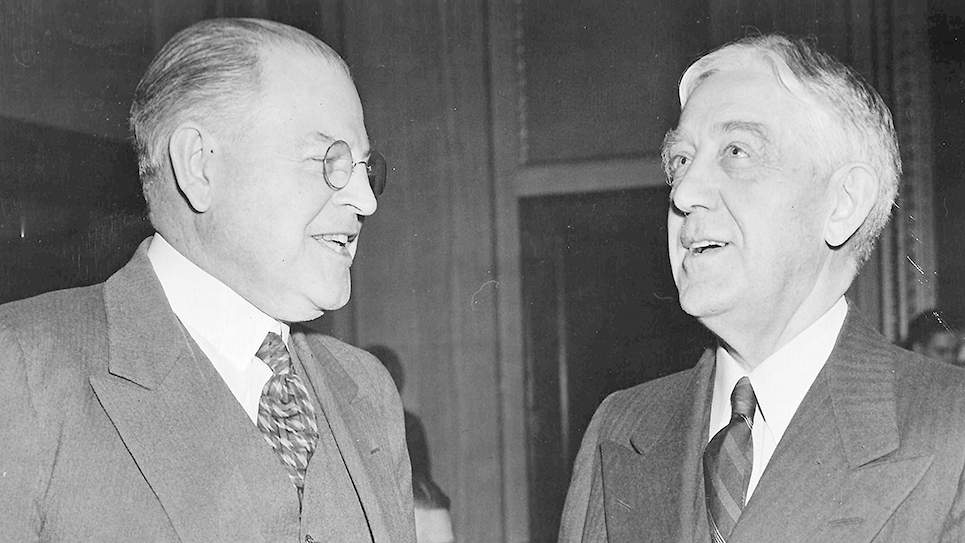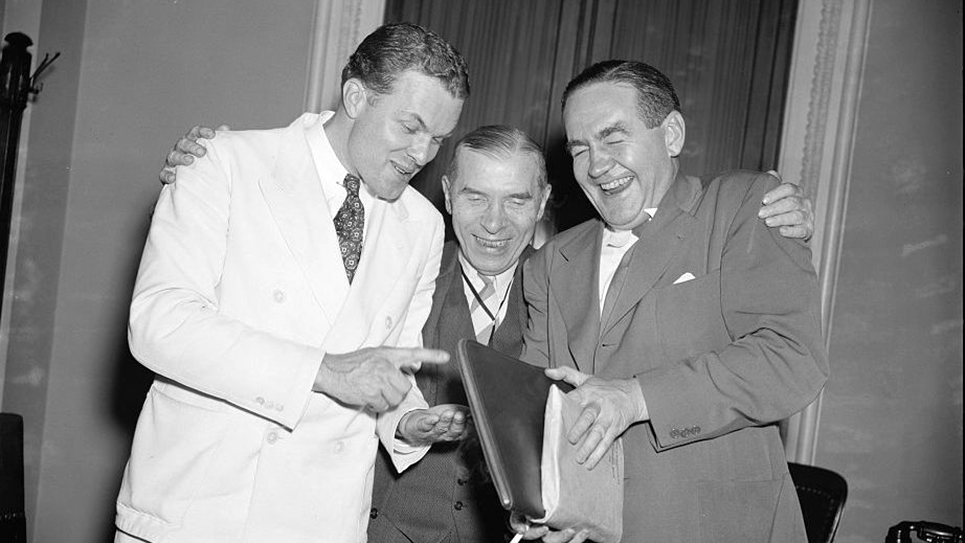Republican Leader: Wallace White of Maine
Wallace Humphrey White Jr. is little remembered today, but at one time he was the leader of Senate Republicans, at least in name. White could easily have come right out of central casting in Hollywood to play the role of a U.S. senator. White-haired with a stately personal appearance, Wallace White came into public service with one of the most immaculate political pedigrees in the Pine Tree State. His grandfather was William P. Frye, who was both a congressman and U.S. senator from Maine. There was an element of tragedy to the Senate career of Wallace White. Although White was the leader of Republicans in the Senate, the real power amongst GOP senators was Robert Taft of Ohio. As noted in his biography by the Senate Historian’s Office, White was quite nearly destroyed by the stress of his leadership role as he was “loved and exploited” by the membership of his own party. For 32 years, Wallace White became an institution in Maine politics and Congress.
Margaret Chase Smith, White’s successor in the United States Senate, recalled the former senator’s personality when he died. “To know Wallace White was to love him. To those of us who were fortunate enough to know him well, he was the personification of gentle patience, deep understanding and quiet greatness.” Mild mannered and generous, Wallace White was universally well-liked by his congressional colleagues. White also had a keen intellect and was oftentimes sought out by younger or newer members for advice and counsel. Majority Leader Scott Lucas recalled, “He spoke from the heart of truth.”
In spite of his national prominence and having the high esteem of the people he represented, Wallace White always was genuinely a modest man. Even after winning election to the U. S. Senate, White missed the collegial atmosphere of the House of Representatives and frequently wandered over to the other wing of the Capitol where he enjoyed eating at the House Restaurant. White would remove the burdens resting upon his own shoulders for a few minutes by taking a seat in the House of Representatives and listening.
A small, compact man, White did not speak in the usual booming tones of many of his colleagues. Wallace White always spoke in a low voice and was self-deprecating. The senator’s friends shook their heads as they believed he considered others more than he should.
During his service in Congress, White became an expert in the field of communications and had a remarkable ability for the art of writing legislation into law. Although mild mannered and modest, Wallace White could be quite direct in debate. When some of his colleagues were highly critical of “subsidies” in a pending Merchant Marine bill, Senator White softly replied, “I am not afraid of a word.”
As might be expected of a United States senator from a coastal state, Wallace White was interested in all matters pertaining to the high seas and oceans. When the Senate was considering an ocean mail contract, it was Senator White who best summarized the issue succinctly. “The real question here is whether you are going to pull down the American flag and get off the seas,” White said.
Unlike many of his more isolationist colleagues, White was strongly for amendments to the Neutrality Act to arm ships in the Merchant Marine as the Second World War loomed. Indeed, White was one of Secretary of State Cordell Hull’s legislative and personal friends. Many Saturday mornings during the war, Wallace White could be spied going into the state department through a rear entrance so as to attract as little notice as possible. White and other members of the Senate leadership would receive weekly secret briefings from the secretary of state.
Maine’s Congressman Robert Hale once attested to White’s knowledge of the Merchant Marine and issues the senator had been involved with during his time in the Senate. “It is conservative to say that he knew as much about merchant marine as any man who ever lived,” Hale said. “He was a great authority on patent law and on radio communications.”
While capable of cooperating with the Democrats, there was no mistaking Wallace White “was a Republican to the bone.” When Republicans lost the presidential election for the fifth straight time in 1948, White said, “People used to be born, live and die Republicans, but they don’t do that any more. Maybe that’s the new way, maybe it’s right, to swing from one party to the other.” After a pause, Senator White added, “But it’s not my way.”
White’s grandfather William P. Frye represented Maine in the Senate for 30 years. White grew up under the watchful eye of his grandfather and gained his first apprenticeship in politics while working as a clerk for the Senate Commerce Committee, which was chaired by Frye. Eventually, White became secretary (today it would be chief of staff) to his grandfather. At the same time he was working for his grandfather, Wallace White attended classes at Colombian College (the forerunner of George Washington University) where he got his law degree. White returned to Maine to practice law and his grandfather continued to serve in the Senate until his death in 1911.
Wallace White first ran for Congress in 1916 against Democratic Congressman Daniel McGillicuddy, who had represented Maine’s Second District for six years. White nudged McGillicuddy out of office by a scant 547 votes. Daniel McGillicuddy sought a rematch two years later, but Wallace White had begun entrenching himself in the district and won easily. Congressman White was routinely reelected every two years, usually by increasing majorities. When Arthur Gould retired from the U.S. Senate in 1930, White announced his candidacy.
Congressman Wallace White faced former governor Ralph O. Brewster inside the GOP primary along with Dugald B. Dewar, who ran as a foe of prohibition. White won better than 50% of the votes cast and carried all sixteen of Maine’s counties in the general election against Democrat Frank Haskell.
White entered the United States Senate while Republicans were still in control of that body, but their majority would be gone by 1933 when Franklin D. Roosevelt took office. To Wallace White the centralization of power in the federal government was anathema and he opposed much of the New Deal. Senator White was oblivious to what was news and therefore was constantly causing reporters headaches. When a reporter complained, Senator White always replied, “I never got into trouble by keeping my mouth shut.”
White was particularly adept at making short after-dinner speeches in Washington that demonstrated wit and good humor. Always polite and habitually punctual, White once arrived at a function precisely at the designated hour of 7 o’clock, only to find the hall dark and empty. Senator White turned around, went home, took off his shoes, ate a sandwich and enjoyed a glass of milk and settled into his library. When Republicans finally trickled into the hall and found their guest of honor missing, they began to panic. Someone finally called the senator’s home.
“You said seven,” White reminded his caller. “I thought maybe I got the wrong night.” The caller explained that in Washington seven o’clock meant eight o’clock. Grumbling a bit, White put his suit and shoes back on and hurried to the event where his seat awaited him at the head table.
When Wallace White sought reelection to a second term in 1936, he faced the most personally popular Democrat in the Pine Tree State, Governor Louis J. Brann. The contest between two highly popular public officials was nip and tuck from beginning to finish. The governor carried six counties to White’s ten, but the election results were tight. Wallace White had edged out Louis J. Brann by 4,648 votes, a margin of 50.75%. Six years later, Senator White was unopposed inside the Republican primary and rolled over his Democrat opponent by carrying every county in the state. White won quite nearly 67% of the ballots cast.
Charles McNary of Oregon, the longtime leader of Republicans in the U. S. Senate, began to ail after having run for the vice presidency on the 1940 GOP ticket with Wendell Willkie. McNary was suffering from a brain tumor and Republicans elevated Wallace White to acting Minority Leader. McNary died in 1944 and White was elected minority leader. When Republicans won a majority in both house of Congress in 1947, Wallace White wanted to take the chairmanship of the Senate Commerce Committee, which he was entitled to do because of seniority. His fellow Republicans were having none of it. Any other prospective candidate to become majority leader would spark an intra-party brawl. Still, White insisted upon chairing the Senate Commerce Committee, causing some who wanted his seats on that and other committees to complain.
Much to the detriment of his personal wishes and happiness, White very reluctantly accepted the post of majority leader. While Wallace White was the acknowledged leader of Senate Republicans to the public, behind the scenes it was Robert Taft who dictated policy and most everything done inside the United States Senate.
The assignment began to seriously worry and wear on Wallace White. In December of 1947, Wallace White checked into Bethesda Naval Hospital. The official reason was the senator was ill with the flu and suffering from exhaustion. Several weeks later, one newspaper reported White’s actual hospitalization involved a “nervous condition,” a polite way of saying the senator had gone through a nervous breakdown. White did not return to the Senate until March 26, 1948. Wallace White never did really resume his position as majority leader, although he still officially occupied the post, the actual work was done by Nebraska’s Kenneth Wherry.
The senator was likely worried about more than official business, especially where his beautiful, honey-blond-haired granddaughter Nina Lunn was concerned. Nina Lunn Black was a regular on the Washington, D.C., social circuit for decades until her death at age eighty in 2005. Senator and Mrs. Wallace White watched as Nina married Nathaniel Luttrell Jr., the heir to the Woodward & Lothrop fortune at the elegant Sulgrave Club in Washington. The marriage ceremony was officiated by the Reverend Peter Marshall, the Senate chaplain. The couple was quietly and discreetly divorced two years later as Nina was having an affair with the Argentinian ambassador to the United States. Nina Lunn had enjoyed a very brief career in the movies in bit parts.
Not only was Senator Wallace White tired, but he was also ailing due to hypertension and heart disease. By 1952, White was confined to his bed. Colleagues on the commerce committee wrote to the former senator remembering his “friendliness, charm., courtesy and painstaking consideration” of others during his service. White was touched by the remembrance, and it was timely. Not long after the letter arrived, Wallace died peacefully in his sleep in his home.
After 32 years in Washington, the 74-year-old Wallace White announced he was not running again in 1948. When one reporter asked him what he was going to do, White replied, “I’m going to sit on the porch at my farm and tell Mrs. White what to do.”
Had he wished, White could have earned a small fortune as a lobbyist with his expertise on a variety of subjects including communications law. True to his word, Wallace White went home to Maine and stayed there. After his death, Mrs. White reported her husband’s time away from Washington gave him some measure of peace. Wallace White was certainly where he wanted to be, back home in Maine.
May Craig, the maven of newspaper columnists from the Northeast, wrote when former Senator Wallace White died, the epitaph on his tombstone should read, “Well done, thou good and faithful servant.”
The Lewiston Sun Journal editorialized that Wallace White throughout his service in Washington “placed conscience and honor above all else.” For most people, it is almost unthinkable a newspaper editorial would remember any public official in such a way as Wallace White was remembered then. Yet there really was a time when giants roamed the halls of Congress.
© 2024 Ray Hill







